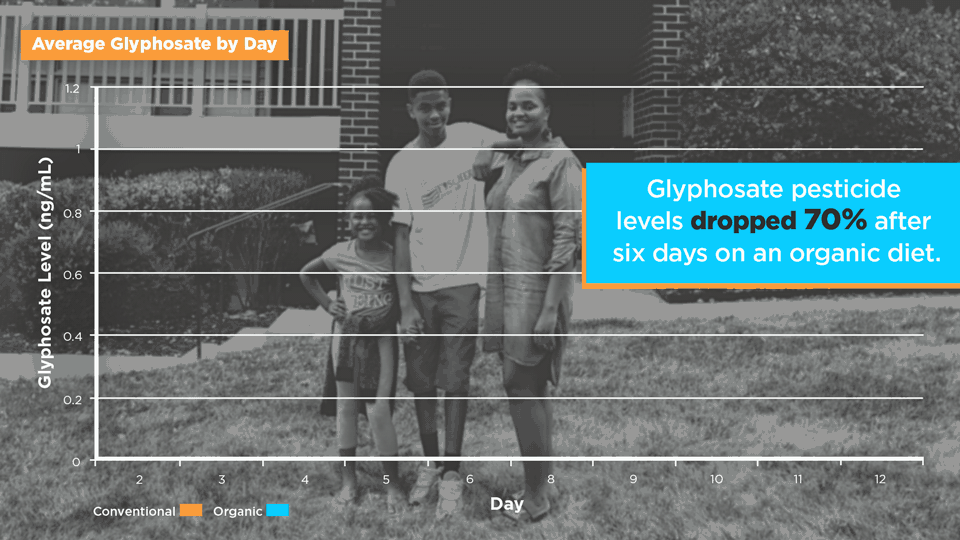A peer-reviewed study published today in the journal Environmental Research found that levels of the pesticide glyphosate in participants’ bodies dropped an average of 70% after six days on an organic diet. The study is one of the first to examine how an organic diet affects exposure to glyphosate, the active ingredient in Bayer’s weedkiller Roundup, the most widely used weedkiller worldwide. It also indicates that for the general population, the food they eat is a primary way they are exposed to this pesticide.

The study, Organic Diet Intervention Significantly Reduces Urinary Glyphosate Levels in U.S. Children and Adults, reaffirms previous research and, along with a companion study from 2019, represents the most comprehensive scientific analysis showing that an organic diet rapidly and dramatically reduces exposure to toxic pesticides, including glyphosate, organophosphates, pyrethroids, neonicotinoids and 2,4-D. Organic farming prohibits the use of these and over 900 other toxic pesticides allowed in non-organic farming.
“It’s striking that levels of this toxic pesticide dropped so dramatically after less than a week. Given our results and related studies on how an organic diet rapidly reduces pesticide exposure, we could expect to see similar reductions in glyphosate levels in most Americans if they switched to an organic diet,” said study co-author Kendra Klein, PhD, senior staff scientist at Friends of the Earth. “That’s the good news. The bad news is that most of us are eating glyphosate-laden food continuously, resulting in daily doses of the chemical from breakfast through dinner.”
Glyphosate Box
Glyphosate Residue Free Certification for Food Brands – Click Here
Test Your Food and Water at Home for Glyphosate – Click Here
Test Your Hair for Glyphosate and other Pesticides – Click Here to Find Our Your Long-Term Exposure
While the study sample is small, the findings are statistically significant and offer important new data indicating more widespread glyphosate exposure than previous studies. Researchers found glyphosate in 100 percent of the participants, including children as young as four, and found that the average level of glyphosate in children was approximately five times higher than in adults.
Participants were four racially diverse families from Minneapolis, Minnesota; Atlanta, Georgia; Baltimore, Maryland; and Oakland, California. Urine samples were collected from parents and children eating their typical diet of conventional food for six days, and again during a controlled diet of all organic food for six days. In addition to glyphosate reductions, the study found a 77% reduction in the main chemical that this pesticide breaks down to in our bodies, AMPA (aminomethyl phosphonic acid).
Use of glyphosate skyrocketed after genetically engineered Roundup Ready ® corn, soy, canola and cotton were introduced in the 1990s, with the market dominated by Monsanto, which was acquired by Bayer in 2018. Glyphosate is also used extensively in school and park landscaping and home gardens.
While this study did not look at the health impacts of glyphosate, research has linked the chemical and formulations like Roundup® to a range of health problems. Glyphosate is classified as a probable human carcinogen by the World Health Organization and has been linked to high rates of kidney disease in farming communities and to shortened pregnancy in a cohort of women in the Midwest. Other research has linked glyphosate and its formulations to endocrine disruption, DNA damage, decreased sperm function, disruption of the gut microbiome, and fatty liver disease. In the environment, glyphosate has been linked to the decimation of Monarch butterfly populations and bee declines.
A series of high-profile court cases in 2019 linked plaintiffs’ non-Hodgkin’s lymphoma to use of Roundup, resulting in over $180 million in punitive damages for Bayer. This summer, Bayer negotiated a $10.9 billion settlement with an additional 95,000 cases, while 30,000 more are still pending.
Since the 1990s, the U.S. Environmental Protection Agency has facilitated increased dietary exposure to glyphosate by raising the legal threshold for residues of glyphosate up to 300 times previous levels for certain foods. The chemical is also increasingly being used on foods like wheat, oats and beans just before harvest to uniformly desiccate crops, a use that has been shown to lead to high levels of glyphosate residue on food.
“We all have the right to food that is free of toxic pesticides,” said Klein, “but our federal regulatory system is broken and is not protecting us. We urgently need our elected leaders to make healthy organic food the norm for everyone by passing policies that support farmers to shift from pesticide-intensive to organic farming.”
“During the coronavirus pandemic, the inequities of our food system have become ever more clear,” said Sharyle Patton, Director of the Commonweal Biomonitoring Resources Center and co-author of the study. “Research shows that communities of color are at higher risk of serious complications and death from coronavirus as a result of already suffering from higher rates of diet-related diseases. Now more than ever, we need public policies that ensure that all communities have access to healthy, organic food.”




















We as a society have to demand change from our politicians. Together we can
make things happen Lobby your politicians